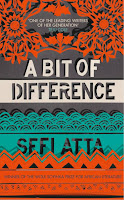 Deola Bello works for a company in London that audits charities and NGOs around the world. She arranges one assignment so that she'll be back in Nigeria in time for the fifth anniversary of the death of her father. But facing her extended family means a whole load of questions - about what she's doing with her life, what she wants and where she belongs...
Deola Bello works for a company in London that audits charities and NGOs around the world. She arranges one assignment so that she'll be back in Nigeria in time for the fifth anniversary of the death of her father. But facing her extended family means a whole load of questions - about what she's doing with her life, what she wants and where she belongs...
Yesterday, I interviewed author Sefi Atta about this 2013 novel for an online event hosted by Macfest - ETA the full interview is now up on YouTube. Sefi is a prolific author - of novels, short stories and plays (for both radio and the stage) - but chose this novel as the focus of our discussion.
She told me that she'd consciously endeavoured to avoid the cliches and stereotypes she'd observed at the time of writing, as expressed in the novel by Deola in a conversation with a writer friend.
"African novels are too exotic for her. Reading them, she often feels they are meant for Western readers, who are more likely to be impressed." (p. 190)
These readers seem to be drawn to tales of catastrophe, as the writer friend responds:
"The more death the better. It is like literary genocide. Kill off all your African characters and you're home and dry. They certainly don't want to hear from the likes of me, writing about trivialities like love." (p. 191).
Deola counters that,
"Love is not trivial. ... Love is epic." (p. 192)
For all we might hear, repeatedly, of the danger of "armed robbers" while Deola is in Nigeria, that threat never materialises. In fact, the only armed conflict here is the protests in London to the ongoing Gulf War (the novel set in 2003). There's corruption in Nigeria but that dovetails with the way Deola is treated, belittled and overlooked by her employers in London, who express disappointment that her report based on first-hand experience is not what they wanted to hear.
Instead, the focus here is on the personal: Deola's friendships, her family, a man she meets in Nigeria and what happens between them. In the course of all this, she's wrestling with her sense of self - her identity and future. For all the backdrop of Gulf War (in London) and poverty, AIDS crisis and corruption (in Nigeria), it's a warm, funny novel full of sharp observations because it's all told from Deola's perspective; her character, concerns and passions set the tone.
















